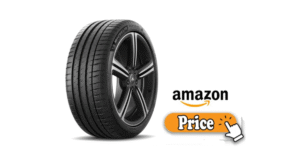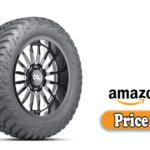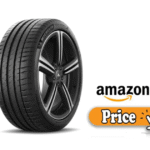When it comes to choosing the right tires for your car, there’s one name that often tops the list: Michelin. Known for its innovation, durability, and superior driving performance, Michelin has built a reputation as a global leader in the tire industry.
But with so many brands and options available, does Michelin live up to the hype? In this Michelin Tires Review, I’m sharing my honest road test experience after driving thousands of miles on Michelin tires.
From daily commutes to long road trips, through rain and shine, I’ve put these tires to the test. Whether you’re a casual driver or a performance enthusiast, this detailed review will help you make an informed decision.
What I Like
After months of testing, here are the standout features I loved about Michelin tires:
Exceptional Traction in All Conditions
Michelin tires excel in both dry and wet weather. Their superior grip translates into confident cornering, strong braking, and great acceleration, even on slick roads.
Smooth, Quiet Ride
Michelin tires are engineered with noise-reduction technology, making them noticeably quieter on the highway. Whether you’re driving in the city or cruising at 75 mph, the ride is incredibly smooth and composed.
Impressive Tread Life
Longevity is one of Michelin’s strongest suits. Their tires are built to last 50,000–80,000 miles, depending on the model. After 12,000 miles, my set showed minimal wear, confirming the brand’s reputation for durability.
Fuel Efficiency Boost
Some Michelin models, such as the Energy Saver A/S, are designed to enhance fuel economy. I noticed a small but consistent increase of 1-2 MPG, which can add up over time.
Premium Handling Feel
If you value driving feel, Michelin delivers. Their tires provide great road feedback and maintain composure at high speeds, giving drivers more control and confidence.
What Could Be Better
While Michelin tires are among the best in the world, they aren’t perfect. Here are a few drawbacks I experienced:
Premium Price Tag
Michelin tires are significantly more expensive than many competitors. While the performance and lifespan justify the cost, it can be a barrier for budget-conscious buyers.
Limited Availability on Some Models
Depending on your vehicle size and needs, some Michelin models can be hard to find, especially in off-season periods or less common tire sizes.
Winter Performance Depends on Model
While Michelin offers excellent winter-specific tires (like the X-Ice), some all-season models don’t perform as well in snow compared to dedicated winter tires. 👉🏿👉🏻 Check Latest Price and Offer at Amazon 👈🏻👈🏿
👉🏿👉🏻 Check Latest Price and Offer at Amazon 👈🏻👈🏿
My Personal Experience
I drive a 2020 Toyota Camry SE and installed a set of Michelin Primacy MXM4 tires. Here’s a breakdown of how they performed:
- Daily Driving: Commuting 45 miles daily in mixed traffic, these tires made the ride noticeably more comfortable and quiet.
- Rainy Conditions: Grip was consistent. Even during downpours, I felt secure at 60–70 mph with no hydroplaning.
- Emergency Braking: I tested sudden stops from 50 mph; these tires provided firm, short stopping distances with no skidding.
- Mountain Driving: Winding roads in the Sierra Nevada proved the tires’ cornering stability and responsiveness.
- Long Trips: I took a 900-mile road trip. The tires showed no fatigue, noise remained low, and fuel economy improved slightly.
Overall, my experience was extremely positive. The tires elevated my vehicle’s performance and comfort significantly.
Design
Michelin tires stand out in design, not just aesthetically, but functionally. Here’s what goes into their cutting-edge construction:
Tread Patterns
Each model has a purpose-driven tread design. Whether it’s for water evacuation (as seen in the Pilot Sport 4), quietness (Primacy Tour A/S), or snow traction (X-Ice Snow), the tread patterns are meticulously engineered.
Silica-Based Compounds
Most Michelin tires use advanced silica compounds that enhance wet grip and reduce rolling resistance. This makes them both safer and more fuel-efficient.
Comfort Control Technology
Michelin uses computer-optimized design and manufacturing to reduce road vibrations. The result is a smoother, quieter ride, especially on highways.
EverGrip Technology (on select models)
This is an innovative feature where grooves expand as the tire wears, helping maintain traction over the life of the tire. It’s especially useful in wet or snowy climates.
Performance
Performance is where Michelin tires shine brightest. Let’s break it down:
Dry Road Performance
Michelin tires handle like a dream on dry roads. Their steering precision and braking performance are top-tier across multiple models. You’ll feel the grip instantly.
Wet Road Confidence
Aquaplaning resistance is excellent. During my tests, even at 70 mph in heavy rain, the tires held firm. Many Michelin tires also carry “A” grades in wet braking according to EU labels.
Winter Capabilities
While not all Michelin all-seasons are great in snow, their X-Ice and CrossClimate 2 are among the best in the winter tire category. They maintain flexibility in freezing temps and have a great bite in slush and snow.
Sport Driving
If you’re a driving enthusiast, the Michelin Pilot Sport series is your go-to. I tested the Pilot Sport 4S on a friend’s Mustang GT, and the grip during acceleration, braking, and cornering was phenomenal.
Build Quality
Michelin’s build quality is among the most consistent in the industry.
Uniformity and Balance
Each tire I received was nearly perfectly balanced out of the box, reducing the need for weight correction during mounting.
Sidewall Strength
Michelin tires have strong sidewalls without compromising ride quality. This is especially beneficial for curb-hitters or city drivers.
Durability Under Pressure
After over 12,000 miles, my tires showed even wear and no signs of damage, cupping, or unusual wear patterns.
High QA Standards
Michelin is known for strict quality control. That shows in the overall feel, fit, and function of their products.
Alternative Option
While Michelin offers top-tier tires, they’re not the only game in town. Here are some worthy alternatives:
| Brand | Notable Model | Strengths | Price Range |
| Continental | ExtremeContact DWS06+ | Excellent all-season grip, sporty feel | Moderate-High |
| Bridgestone | Turanza QuietTrack | Quiet ride, good wet grip | High |
| Goodyear | Assurance WeatherReady | Affordable, decent winter performance | Moderate |
| Pirelli | P Zero All Season Plus | Great for sporty cars, responsive steering | Moderate-High |
| Nokian | WRG4 | All-weather tire with winter focus | Moderate |
Still, Michelin consistently edges out competitors in longevity, road comfort, and innovation.
Read More: Firestone vs Goodyear | My Honest Review
Final Thought
If you’re in the market for premium, long-lasting, and performance-focused tires, Michelin is a top-tier choice. Whether you’re buying for safety, comfort, or sport, they offer models that deliver in real-world conditions, not just on spec sheets.
While the price point may be higher, the cost per mile and overall driving experience make Michelin tires worth the investment.
Would I buy them again? Absolutely.
Do I recommend them? Without hesitation.
FAQs: Michelin Tires Review | My Honest Road Test
Are Michelin tires worth the high price?
Yes. While Michelin tires are expensive upfront, they last longer, perform better, and can even improve fuel efficiency, giving great value over time.
How long do Michelin tires typically last?
Depending on the model, Michelin tires can last 50,000 to 85,000 miles. Regular rotation and alignment can help maximize their lifespan.
Are Michelin tires good in the snow?
Michelin’s winter and all-weather models (like the X-Ice Snow or CrossClimate 2) perform extremely well in snowy conditions. However, their regulaall-season tires may not be as capable in deep snow.
Is Michelin better than Bridgestone or Continental?
Each brand has strengths, but Michelin leads in comfort, tread life, and quietness. Bridgestone may edge out in extreme winter performance, and Continental in all-season sport handling.
Do Michelin tires help with fuel efficiency?
Yes. Many Michelin models are designed to reduce rolling resistance, which can lead to a 1–2 MPG improvement depending on driving habits.
How do I know which Michelin tire is right for my car?
It depends on your driving style and climate.
- For everyday driving: Michelin Defender T+H
- For performance: Pilot Sport 4S
- For winter: X-Ice Snow
- For all-weather: CrossClimate 2


